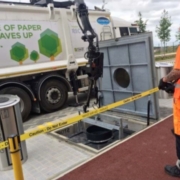A perfect co-mingled storm!
If your authority currently has responsibility for fully co-mingled processing costs, Ben Parsons, Senior Consultant at APSE Solutions, explains how should you prepare for them.
There appears to be anecdotal evidence that a perfect storm is beginning to hit some local authorities hard. While some have possibly already got a list of a dozen or more possibilities for that storms’ name, I am referring to that of fully co-mingled recycling processing costs.
These issues include, but are not limited to:
- The Draft Resources and Waste Strategy; which will result in changing waste streams, a requirement to process flexible plastics, which will be technically challenging for most MRF’s; a significant uncertainty calling into doubt their long-term future.
- Fires, often but not exclusively caused by Lithium-ion batteries; as recent complete plant fire losses prove this remains ever present and real and one of possibly increasing threat.
- Super-size plants become a super-size financial and contingency planning risk; increasing fires may mean they become un-insurable longer term, but smaller plants lack the scale required for the costly technology.
- Waste export bans; means there is little to no market for poor quality recyclate out-puts, resulting in increasing costs of more sophisticated expensive technology and manual labour picking.
- Increasing levels of contamination; APSE data shows that contamination levels have increased as awareness campaigns have fallen, resulting in increased load rejections and costs, especially in a situation of material over supply.
- Reducing plant availability; is leading to increased gate fees and rejections of less than desirable loads, as well as increasing the travel distance to alternative plants, increasing transport costs.
- National long-term driver shortage and increasing transport costs; risking transport disruption. More vehicles are required if transport distances increase, additionally more loads are required as materials have become more voluminous increasing the number of drivers required. As the paper content diminishes, corrugated cardboard goes up and packaging, especially plastic bottles is increasingly ‘light weighted’ through design, it becomes more difficult to achieve bulker payloads substantially increasing costs per tonne.
APSE has recently heard from some authorities where for one reason or another they have found themselves negotiating contracts for processing and / or transporting recyclate from fully co-mingled collections meaning they have experienced dramatic price increases and increasingly rejected loads.
So, if your authority currently has responsibility for fully co-mingled processing costs how should you prepare for such a storm?
Besides contacting APSE Solutions in good time, the other first step is to ascertain your contracts’ extension or renewal date and while you have the contract in front of you why not check up on the contingency arrangements. What would happen in the event of their site experiencing flooding, fire, demise of the contractor. If any of the answers have left you in a cold sweat, please do call us to find out how we can assist.
While we all await with abated breath the outcome of the draft Resources and Waste Strategy / Environment Bill, it makes sense to avoid un-necessary service changes. However, that should not prevent option consideration, indeed it appears the threat of change in itself is forcing change from the uncertainty, especially so if your co-mingled recyclate processing contract is coming to an end in two- or three-years’ time. Moreover, pressure is also likely to increase on the service to respond to the climate change emergency. Now really is the time to start understanding the other options, besides the often default full kerbside sort, which is likely to be an ever-increasing challenge with HGV driver shortages, decreasing amounts of paper and ever-increasing cardboard volumes. So, whether in-sourced or out, please allow us the opportunity to find the solutions for your resource collections service.
This article has been written by Ben Parsons MCIWM, a Senior Consultant with APSE Solutions, involved in the creation of the APSE & Liverpool City Council URS Framework which enables all public bodies to make direct drawdown of all things URS available in four separate lots, including the units themselves, installation and maintenance, vehicles to empty them, and all related technology / telematics, including fill level sensors, container & vehicle weighing, routing / service confirmation software.
To either understand the URS potential further, a feasibility study, or a direct URS frame work drawdown please contact the APSE Solutions Team through [email protected]


.png)



.png)